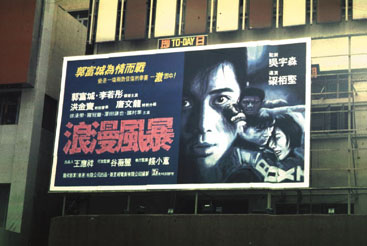 Local film crisis
Local film crisisHas Hong Kong been defeated by Hollywood in the movie war?



 Local film crisis
Local film crisis
Has Hong Kong been defeated
by Hollywood in the movie war?
By Helen Chan
Such is the busy film world of Hong Kong.
Unfortunately, the local film industry has taken a downturn in the past few years. In 1993, the market value of all local films amounted to $1.5 billion. This figure dropped by 8.57 percent in 1994, and it is believed that 1996's revenues may be 10 percent less than those of 1993.
“I am afraid that it will soon be the end of local film industry,” said Mr. Paul Fonoroff, who discusses films on television and writes criticism of local films in the South China Morning Post. He said the fall in boxoffice revenues is the result of the high price of movie tickets.
He said, “Consumers are reluctant to watch a movie of common scale of production at a cost of $50 or more, since they can get it at a much cheaper cost about six months later in video stores.
“Besides, there are very few local megastars like Jackie Chan and Chow Yun-fat, who have the charisma to attract a large cinema audience.”
 Mr. Fonoroff said, “A 50 percent reduction in the price of movie tickets would help.”
Mr. Fonoroff said, “A 50 percent reduction in the price of movie tickets would help.”
On the other hand, Mr. Thomas Shin, a well-known film critic in the Territory, commented that the decline of the overall standard of Hong Kong movies is yet another factor pushing the industry to the verge of extinction.
“Despite the advancement in film-making technology, we have failed to improve the quality of local films,” Mr. Shin said. “Local producers are unable to attract audiences with new ideas.”
 Above: Local producer Chan Ka-sheung.
Above: Local producer Chan Ka-sheung.
Mr. Shin noticed that local producers tend to do mass replication of films of similar type over and over again, since the first replication seems to be successful. In the long run, this “scares consumers away”.
Moreover, he thought that young directors in Hong Kong have lost their energies and passions for making outstanding films.
“Not enough opportunity is given to those inexperienced film workers,” said Mr. Shin. “Producers do not think new film studies graduates are capable of making good films. Yet it is important to transfer production experience from one generation to the next.”
He continued, “The situation got worse when production projects started to cut their budgets in 1990s.”
At the moment, both Hong Kong Baptist University and the Academy of Performing Arts offer specific courses in film studies.
However, Mr. Stephen Lam Hon-fun, a cinematography lecturer from the TV and Film Division of the Academy of Performing Arts, said that there are not enough courses to train good film workers.
“There is always a difference between what is taught in schools and what ought to be done in a real life situation,” Mr. Lam said.
Mr. Chan Ka-sheung is one of the few directors capable of adding creativity and variety to his films. He aims at bringing innovations to the local market and, at the same time, avoiding losses to the investors.
Mr. Chan said, “Competition from Hollywood films is intense. The American film industry is in a much better position because of a better production system and technology, more systematic film schools, a larger market and a greater amount of investment.”
He used a metaphor: “It is like a French restaurant serving sirloin steak, and the local noodle shop imitates it by providing noodles with beef brisket,” he said.
“It is unreasonable for consumers to compare these two different kinds of food. In fact, some outstanding dishes provided by the noodle shop are also praised by consumers who often visit a French restaurant,” he said.
Mr. Chan also agreed that a reduction in the price of movie tickets is one practical method to raise the box office revenue for local films. He thought that it would bring back the family audience, but a “remarkable improvement” in film quality would be of greater help in the long run.
Said Mr. Chan: “Local producers should employ professionals to write a good script, which is the basis of a film. Copying plots from Hollywood films is not a guarantee at the box office, as consumers would have probably seen them before.”
Mr. Fonoroff encouraged film production companies to give more acting chances to starlets.
“Higher flexibility in film distribution should also be allowed,” he said. “Distributors may consider locating not-very-popular films in theatre chains for foreign films so that they can stay in show longer.”
Mr. Shin argued that film critics in newspapers and magazines can help the audience evaluate a film from professional perspectives.
“At present, most consumers go to a movie simply because the majority have seen it. They lack a critical mind to evaluate films with their own points of view,” said he.
However, Mr. Chan said, “Some film critics tend to be extremely hostile towards local films, whereas no attacks are fired at numerous bad Hollywood films. It is really unfair to those local filmmakers who have worked hard to produce outstanding movies.”
Mr. Lam of the Academy of Performing Arts urged the government to use more resources in promoting the film culture in Hong Kong.
“A comprehensive system to train film workers is crucial to the future development of Hong Kong film industry,” he said.

